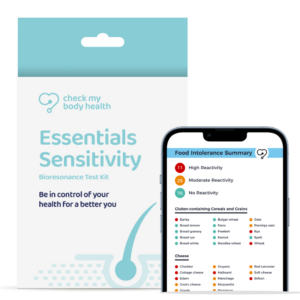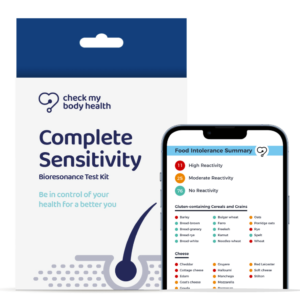Banana Intolerance & Allergy | Signs & Symptoms

Medically reviewed by Sian Baker, Dip ION mBANT mCNHC
on April 01, 2023. To give you technically accurate, evidence-based information, content published on the Check My Body Health blog is reviewed by credentialed professionals with expertise in medical and bioscience fields.

Banana allergy or intolerance is a reaction to consuming bananas or banana-containing foods. Banana allergy is caused by an immune system response to certain proteins found in bananas and can result in symptoms such as itching, hives, swelling, nausea, vomiting, coughing, sneezing, diarrhoea, and in severe cases, anaphylaxis. The symptoms of banana intolerance are gastrointestinal such as bloating, gas, discomfort, changes in bowel movements and diarrhoea, and are generally caused by the body’s inability to effectively break down the food.
Banana allergy can take two different forms; one associated to tree-pollen such as birch and the other associated with latex allergy, sometimes called latex-fruit syndrome. Latex-fruit syndrome is when those with a latex allergy experience cross-reactivity to certain fruits, including bananas, chestnut, avocado, mango and kiwi. If you suspect you have a banana allergy or intolerance, it’s best to consult with a doctor for proper diagnosis and treatment.
What are the common symptoms of a banana allergy or intolerance?
The common symptoms of a banana allergy include:
- Skin reactions such as itching, hives, or swelling of the face, lips, or tongue
- Gastrointestinal symptoms such as nausea, vomiting, diarrhoea, and abdominal pain
- Respiratory symptoms such as coughing, wheezing, or shortness of breath
- Anaphylaxis, which is a severe and potentially life-threatening allergic reaction that can cause symptoms such as rapid heartbeat, low blood pressure, and difficulty breathing
The common symptoms of a banana intolerance include:
- Gastrointestinal symptoms such as bloating, gas, abdominal discomfort, changes in bowel movements, constipation and diarrhoea
It’s important to note that the symptoms of a banana allergy or intolerance can vary from person to person and may range from mild to severe. If you experience any symptoms after consuming bananas or banana-containing foods, it’s best to seek medical attention as soon as possible.
How do you test for banana allergy or intolerance
There are several ways to test for a banana allergy including:
Skin prick test: A small amount of banana extract is placed on the skin and a needle is used to prick the surface. The reaction of the skin is observed for signs of itching, redness, or swelling.
Blood test: A blood sample is taken and tested for the presence of antibodies to banana proteins. This test can measure the level of immunoglobulin E (IgE) antibodies, which are involved in an allergic response.
Oral food challenge: This is a diagnostic test in which the individual is given a small amount of banana to eat, and the reaction is monitored. Note this test MUST be done under medical supervision and is considered the most accurate test for food allergies.
It’s important to note that a positive test result does not necessarily mean that the person has a banana allergy, and a negative test result does not rule it out. The best way to confirm a banana allergy or intolerance is to see an allergist, who can perform a thorough evaluation and make a diagnosis based on the individual’s symptoms and test results.
There are several ways to test for a banana intolerance including:
Blood test: A blood sample is taken and tested for the presence of immunoglobulin G (IgG) antibodies.
Food and symptom diary: Tracking your food and any symptoms can be a very useful way to identify food intolerance. A subsequent elimination diet can help to further understand intolerance.
How many people are affected by a banana allergy or intolerance
It is difficult to determine the exact number of people affected by a banana allergy or intolerance, as it can vary greatly based on geography, ethnicity, and other factors. Banana allergies are considered rare, but they can occur in both children and adults. A recent study estimated that the prevalence of banana allergy in children is around 0.1% to 0.5%. However, it’s important to note that the prevalence of banana allergy or intolerance can be underreported, as some individuals may not recognize their symptoms as being related to bananas or may not seek medical attention. If you suspect that you or someone you know has a banana allergy or intolerance, it’s best to seek medical advice for proper diagnosis and treatment.
How long can a banana allergy or intolerance last?
The duration of a banana allergy or intolerance can vary greatly from person to person. In some cases, individuals may outgrow their allergy or intolerance over time, whilst for others it is lifelong and they may experience symptoms every time they consume bananas or banana-containing foods. The severity and duration of symptoms of allergy can also vary depending on the individual’s immune system and the amount of banana consumed. If you have a banana allergy or intolerance, it’s best to avoid bananas and to seek medical advice for proper management and treatment.
What foods should I avoid if i have a banana allergy or intolerance
If you have a banana intolerance or particularly banana allergy, you should avoid all foods that contain bananas, including:
- Fresh bananas
- Dried bananas
- Banana flour
- Banana puree or baby food
- Banana-based products, such as banana bread and banana pudding
It’s important to carefully read food labels, as banana may be hidden in some processed foods, such as smoothies, baked goods, and certain sweeteners. You may also want to check with restaurants and food manufacturers to ensure that their products do not contain bananas or any banana-based ingredients. If you have a severe allergy, you may also need to avoid cross-reactive foods, such as latex, avocado, mango, chestnut and kiwi, which can cause a similar reaction in some individuals.



